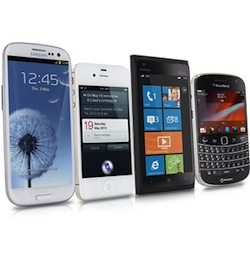Smartphone manufacturers must optimise both hardware and software configurations to improve battery life, according to new research.
The report, compiled by research firm Yankee Group, analysed correlating features of more than 850 smartphones introduced between 2009 and 2013 with measured battery life.
“Many consumers and smartphone salespeople obsess about the size of smartphone screens, the speed of their processors, and the technology behind their radios,” said Carl Howe, Vice President of Yankee Group and author of the report.
“But hidden behind all those smartphone features is a technology almost no one understands, yet without which we would not have any mobile communication: the battery.”
The size of smartphones has increased dramatically in the last five years, the report confirmed, with phone manufacturers improving battery life by using physically large batteries.
But while large batteries increase charging time, they release more heat and cost more.
On the other hand, if smartphone manufacturers keep making components that consume more power and require bigger batteries, the phones will grow increasingly uncomfortable to hold.
Howe added: “Advances in battery technology itself are unlikely to yield any significant increases in battery life without other changes.”
Battery efficiency is easier to achieve for manufacturers that can optimise both hardware and software configurations for longer operating time, according to the report.
There is no single solution for poor battery. However, dedicated silicon chips for voice recognition such as in the Motorola X and smarter software such as Qualcomm’s Network Socket Request Manager can create better user experiences while reducing power consumption.
“Smartphone designers must end today’s specification arms race for power-hungry multi-gigahertz devices and start optimising for user experience,” Howe adds.
Apple has the highest mean battery life and power efficiency; it has increased the iPhone 5’s browsing life by 45 percent to 9.9 hours, for example.
According to Howe, the iPhone is on track to “wring more than twice the browsing efficiency of the more hardware-agnostic Android and Windows Phone platforms by 2015”.
Data from the report shows that the battery of iPhone 5 is half the size of the Samsung Galaxy S4 but stores more power per-gram. Samsung’s battery is 80 percent bigger in terms of storage capacity, but that is due to size of the battery.
Meanwhile, Android and Blackberry have both made “dramatic” gains in browsing battery life, but have lost ground in the efficiency area. Motorola occupies the third spot in battery life ranking.
Microsoft and Nokia have made little progress in both browsing time and efficiency, the report found. Overall, consumers rank battery life as the top factor in their buying decision, ahead of price and internet access.
Read more:
Latest VoLTE devices offer significant battery life improvement
Mobile Europe’s fourth annual industry survey is now live. Click here to take part.


